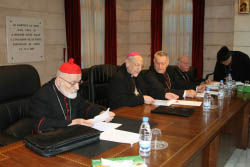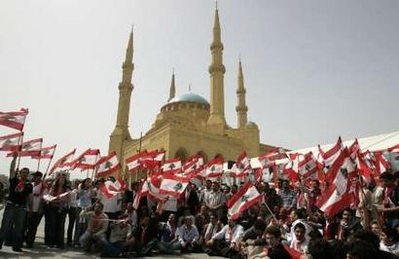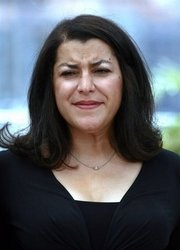Lebanon in the Period of Cheikh Hossun El Khazen
03 April 2008
After death of Cheikh Abi Nawfal, his sons carried on managing Emir Ahmed Maa'n's governing. Their skills did not fail their father, grandfather, and relatives from the Khazen family's skills as they continued working on development and tightening the Catholic faith and its defence. Following this, other Catholic faiths such the Armenian and Assyrian turned to Keserwan to seek protection against oppression of their enemies. The Khazen Cheikhs in return, provided them areas to live in and a source to make a living out of; they followed heritage of their father and grandfather by welcoming Latin missionaries who would make Keserwan their stay.
In year 1693, the country faced a crisis which led to end of Emir Ahmed's governing. Following that, Emir Musa, the Yamni, took control of seven counties which Emir Ahmed Maa'n controlled. He ordered troops to be sent to Bekaa', a thing that led Cheikh Hossun son of Cheikh Fayyad or Abi Kanso son of Abi Nawfal El Khazen and other Cheikhs to turn to Darsen Mohammed Tofotaj Pasha, asking not to permit army to enter Keserwan and pursue an act of steeling and robbing. Pasha Darsen's reaction was understanding and appointing Cheikh Hossun El Khazen a Treasure Supervisor over tax and payments which people of Jbeil's counties had to pay; this appointment included welfare of these counties. Cheikh Hossun?s handling of such position was effective because of hard work, and he made sure that protection is provided to any one who is a Emir or of a common people class, having them Kaisses.
The three-point Arab initiative calls for the election of the commander of the Lebanese Armed Forces, General Michel Suleiman, as a consensus president, the formation of a national unity government and the drafting of a fair and representative electoral law. "The situation in Lebanon is preventing the country from recovering on the economic level, and this pushes economic sectors and the working class to complain of declining living conditions and to threaten strikes," the bishops said. "The present situation could damage summertime tourism. This requires the government to take steps to facilitate the arrival of tourists to Lebanon," they added. The Maronite bishops said that the government must deal with the problems regarding the standard of living "in a responsible manner." By Maroun Khoury and Nafez Qawas, BKIRKI: The Council of Maronite Bishops called on Wednesday for the immediate implementation of the Arab initiative to solve the deadlock in Lebanon, while sounding the alarm concerning "strenuous" economic conditions faced by the Lebanese. The Maronite bishops said it was unfortunate that a Lebanese president was not able to participate in the recent Arab summit, especially after the Arab League had stressed the need to elect a president in Lebanon. "We call for internal and external cooperation to implement the Arab initiative to solve Lebanon's crisis," the bishops said after their monthly meeting in Bkirki.
By Maroun Khoury and Nafez Qawas, BKIRKI: The Council of Maronite Bishops called on Wednesday for the immediate implementation of the Arab initiative to solve the deadlock in Lebanon, while sounding the alarm concerning "strenuous" economic conditions faced by the Lebanese. The Maronite bishops said it was unfortunate that a Lebanese president was not able to participate in the recent Arab summit, especially after the Arab League had stressed the need to elect a president in Lebanon. "We call for internal and external cooperation to implement the Arab initiative to solve Lebanon's crisis," the bishops said after their monthly meeting in Bkirki.
 By CLAUDE SALHANI, UPI Contributing Editor, WASHINGTON, March 31 (UPI) -- As expected, there were no surprises at the Arab summit in Damascus that ended Sunday without any breakthrough regarding the Lebanese presidential crisis. If anything came out of the summit -- boycotted by 11 of the 22 members of the Arab League -- it is the obvious and deep divisions that remain between what is perceived as the pro-Washington countries and Syria. Supporting the Beirut government -- and the U.S. position -- are primarily Egypt, Jordan and Saudi Arabia, whose leaders did not attend the summit in Syria, preferring to be represented by lower-ranking ministers in protest against Syria's role in Lebanon.
By CLAUDE SALHANI, UPI Contributing Editor, WASHINGTON, March 31 (UPI) -- As expected, there were no surprises at the Arab summit in Damascus that ended Sunday without any breakthrough regarding the Lebanese presidential crisis. If anything came out of the summit -- boycotted by 11 of the 22 members of the Arab League -- it is the obvious and deep divisions that remain between what is perceived as the pro-Washington countries and Syria. Supporting the Beirut government -- and the U.S. position -- are primarily Egypt, Jordan and Saudi Arabia, whose leaders did not attend the summit in Syria, preferring to be represented by lower-ranking ministers in protest against Syria's role in Lebanon.
Perhaps the one surprise, strange as it might appear, is that the voice of reason from the Damascus summit was none other than that of Libyan leader Col. Moammar Gadhafi, who warned his fellow leaders that they risk being deposed much like former Iraqi President Saddam Hussein. "One day, you will see yourselves in a similar situation and at that time no one should blame (anyone) but himself because we did not work sincerely to build a strong and unified Arab nation," said the Libyan leader. "Each one of you hates others. Syria is not on good terms with its neighbors, while Libya has stronger ties with Italy than it has with Tunisia or Egypt," Gadhafi said at the opening of the two-day summit. "No notable development has come out of this summit, as has always been the case with previous summits," said Gadhafi to journalists covering the event. "The most important point of the summit is the fact that we have recognized the existence of divisions, problems, and animosity between Arab countries and that we have to find the means to overcome these problems," he said.
 BEIRUT (AFP) - Lebanese authorities reversed on Thursday a decision to ban the prize-winning animated film "Persepolis," following an outcry and claims the measure was aimed at pleasing Iran and Shiite clerics. The general security department, which initially prohibited the film, said the ministry of interior, of which it is a part, had "decided to authorise the film's distribution in Lebanon".
BEIRUT (AFP) - Lebanese authorities reversed on Thursday a decision to ban the prize-winning animated film "Persepolis," following an outcry and claims the measure was aimed at pleasing Iran and Shiite clerics. The general security department, which initially prohibited the film, said the ministry of interior, of which it is a part, had "decided to authorise the film's distribution in Lebanon".
It said "personal, political or confessional motivations" had nothing to do with the original banning. On Wednesday, general security chief General Wafiq Jizzini, whose agency handles censorship, told AFP he had decided to ban the film after Shiite officials expressed concern that its content was offensive to Muslims and to Iran. "The office that handles censorship matters informed me in their report that the film attacks Islam and the Iranian regime, and this could spark tension with Iran," Jizzini said. "I can go back on my decision, I respect freedom of expression," he said. "But given the current political crisis in Lebanon , this is not the time to add fuel to the fire."
Jizzini said Hezbollah had not influenced his decision to prohibit the film.The ban drew condemnation in many circles, with some saying it smacked of hypocrisy and showed that some within the government were kowtowing to Iran. Culture Minister Tareq Mitri said he saw no reason why the film should be banned and that he had urged the interior ministry to rescind its decision.
Khazen History


Historical Feature:
Churches and Monasteries of the Khazen family

St. Anthony of Padua Church in Ballouneh
Mar Abda Church in Bakaatit Kanaan
Saint Michael Church in Bkaatouta
Saint Therese Church in Qolayaat
Saint Simeon Stylites (مار سمعان العامودي) Church In Ajaltoun
Virgin Mary Church (سيدة المعونات) in Sheilé
Assumption of Mary Church in Ballouneh
1 - The sword of the Maronite Prince
2 - LES KHAZEN CONSULS DE FRANCE
3 - LES MARONITES & LES KHAZEN
4 - LES MAAN & LES KHAZEN
5 - ORIGINE DE LA FAMILLE
Population Movements to Keserwan - The Khazens and The Maans
ما جاء عن الثورة في المقاطعة الكسروانية
ثورة أهالي كسروان على المشايخ الخوازنة وأسبابها
Origins of the "Prince of Maronite" Title
Growing diversity: the Khazin sheiks and the clergy in the first decades of the 18th century
Historical Members:
Barbar Beik El Khazen [English]
Patriach Toubia Kaiss El Khazen(Biography & Life Part1 Part2) (Arabic)
Patriach Youssef Dargham El Khazen (Cont'd)
Cheikh Bishara Jafal El Khazen
Patriarch Youssef Raji El Khazen
The Martyrs Cheikh Philippe & Cheikh Farid El Khazen
Cheikh Nawfal El Khazen (Consul De France)
Cheikh Hossun El Khazen (Consul De France)
Cheikh Abou-Nawfal El Khazen (Consul De France)
Cheikh Francis Abee Nader & his son Yousef
Cheikh Abou-Kanso El Khazen (Consul De France)
Cheikh Abou Nader El Khazen
Cheikh Chafic El Khazen
Cheikh Keserwan El Khazen
Cheikh Serhal El Khazen [English]
Cheikh Rafiq El Khazen [English]
Cheikh Hanna El Khazen
Cheikha Arzi El Khazen
Marie El Khazen